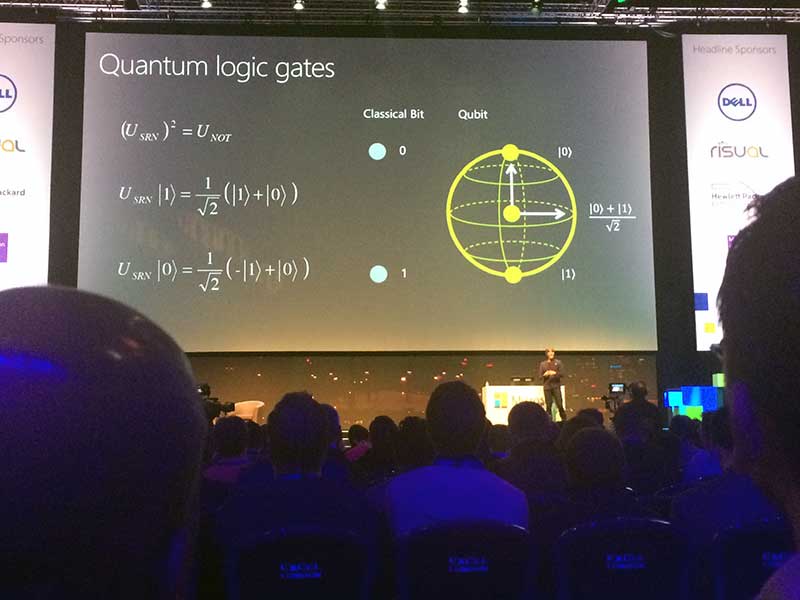Future Decoded 2015
It's not often I get to go off to a conference. But today I had the pleasure of heading to the Technical Day of Microsoft's Future Decoded.
Future Decoded is an event held to discuss the tech of tomorrow. Enterprise systems typically take a lot of work to keep with the times. How can (crucially Microsoft's) tools available today help you tomorrow?
For the most part this was an event for the hardcore enterprise IT professionals, for which I am not. I was here for the web stuff. But the event really showed what great technical advances we're making and indeed how they're helping in some unexpected ways. It was all rather enjoyable, really!
Connected Cows
The keynote brought to light some interesting discussions about the Internet of Things accompanied by many great voices on the topic, including Kevin Ashton - the unashamed father of the term.
Predicting the future is easy. Believing it is hard.
Scott Guthrie, EVP of Microsoft, kicked off the Azure pitch by showing how its machine learning components allow for insights to data not always possible. Fujitsu used it to create GyuHo, a SaaS platform for tracking cows using a pedometer.
Turns out when the cows walked around more, they were on heat. Machine learning allowed them to notify workers of this fact, knowing that artificial insemination of the cow within the next 24 hours would be more likely to result in a female calf. That's the sort of insight machine learning is opening up.
Kevin's belief is that the future of the Internet of Things doesn't lie with RFID wine bottles or smart water bottles, it lies in the numbers. With the vast array of data out there in many forms across the world, bringing those together and a bit of number crunching can provide greater insight into the world we live in.
At the end of it all, Microsoft has been able to use this to put together some APIs created from the data called Project Oxford, which is well worth checking out.
Robot Bartenders
With the keynote over, there was a bit of a break before the web sessions, so I took a stroll around the expo floor.
There were plenty of breakout sessions for the app and game developers, which I kept within earshot of. From languages, to user retention, there was something for everyone.
One of the things I was a big fan of was the Makr Shakr, a robotic bartender. A couple of taps and a scan of a QR code and a fancy pink robot makes a) a bit of a mess, and b) your custom cocktail. It's magical, if not totally impractical for my 1 bed flat.
Overall, the expo hall was out to show what Microsoft does best. Everything, apparently. Continuum was demoed and seems like a great example of how hard we push our mobile devices now, even if the solution isn't particularly practical.
Also, the Surface Hub is huge. Gigantic. Almost too big. I'm sure there's a use-case for it, but it's beyond me.
More vs. May
Unfortunately due to timings, it seemed a lot of the stuff I wanted to check out was all happening at the same time. I only got to head to a couple of talks this time round.
One of which was talk titled 'Of Innovation and Impatience' given by Christian Heilmann.
It tackled a lot of things I've been batting around in my head recently. While Moore's Law states (or, rather, used to) that computing power increases every couple of years, we've been writing more and more inefficient code that counteracts this. We've been adding bloat across the web for a long time with framework after framework that re-invents the wheel slowing aging on the shelf.
Frameworks certainly aren't a bad thing but once we start using the wrong tools for every implementation we're suddenly left with a mess that's hard to move forward from.
Recently I've been trying to update my front end skill-set with the latest bells and whistles as, quite frankly, they look good on a CV. It's easy to be talking to someone new and sprout buzzwords at them and they'll know you know what you're talking about. It's no good using them if you don't know when to use them, or if it's simply because it's easier for you to make it in that while the end user suffers.
...anyway, I digress. I highly recommend giving that slide deck a flick through.
The Quantum Computer
Finally, the closing talk of the conference was a talk given by Brian Cox and Krysta Svore about the possibility of quantum computing and its implications.

While Professor Brian Cox did the science, Krysta gave us a brief history of quantum computing to date and where we're at now. It's great to see this isn't just a theoretical brain exercise, but something of actual possibility.
What it boils down to is essentially quantum computers would be so fast that it could decrypt our current accepted secure encryption in no time at all. A bit worrying.
If you're smarter than me, they've opened up Project Liquid to simulate quantum computing to help work with it.
All in all, a very enjoyable day learning about some things I wasn't expecting to! If you get the chance I would recommend visiting next year. Who knows what we might be talking about then...
